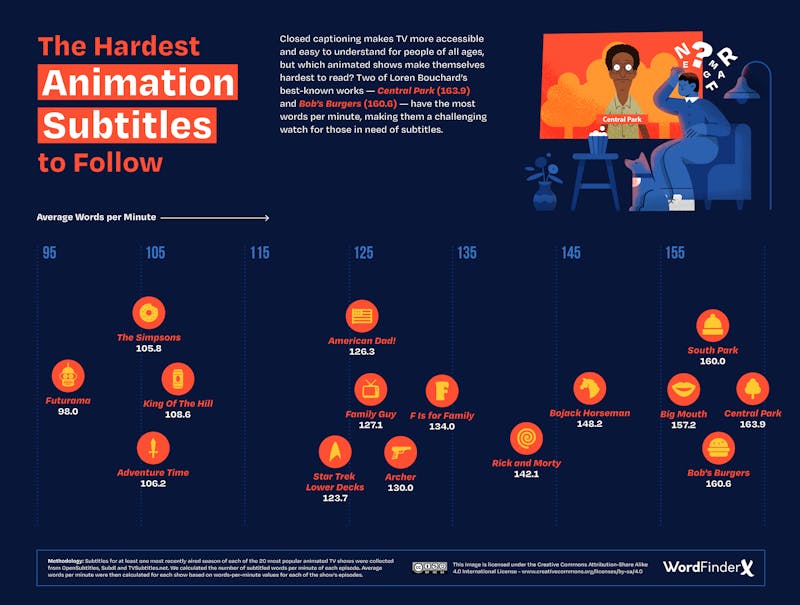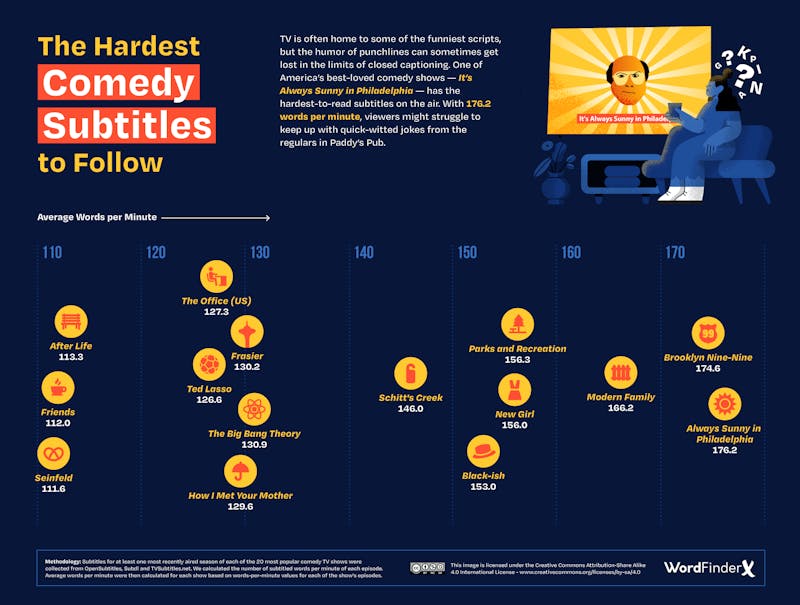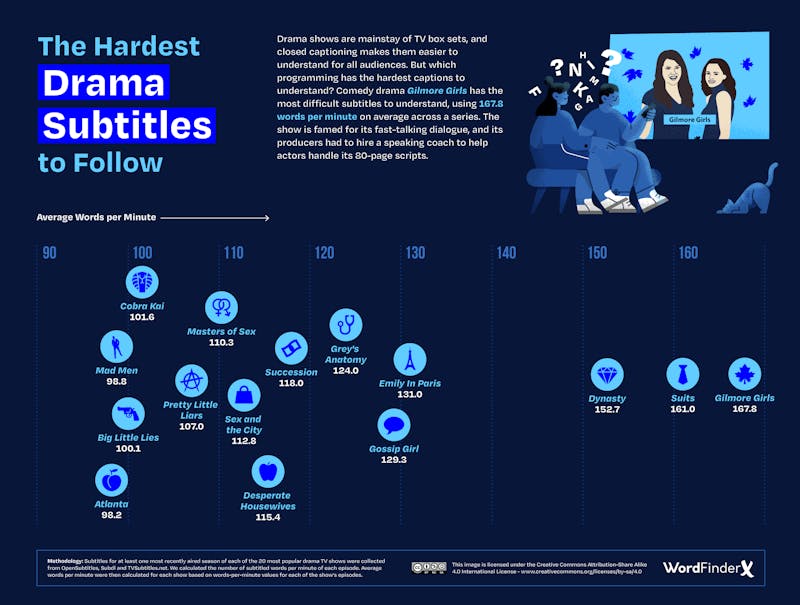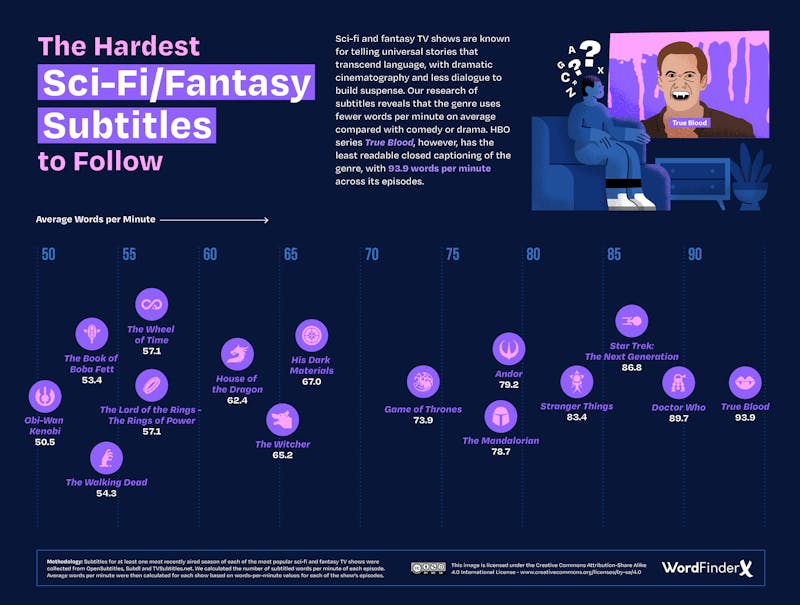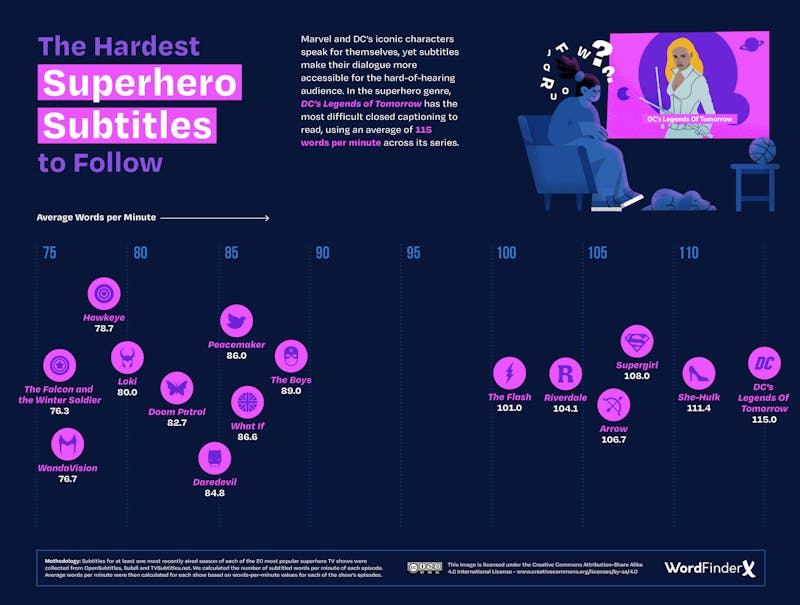The Most Difficult TV Shows to Understand

Who says that nobody reads anymore?
Some four out of five 18-25-year-olds use subtitles when watching TV shows, even though only one in ten of these say they are deaf or hard of hearing. Subtitles-on has become the standard way to watch (with some arguing it should be the standard way to broadcast) as we battle to make sense of more complicated shows in a louder world.
TV is no longer something to watch from the sofa in reverent silence or dutifully helping your gran follow the street lingo. We watch it on buses, in busy kitchens, while texting on another device and studying on a third. We use subtitles to follow the plot, learn a language (anyone fancy Welsh?) or just to hold our attention.
And then there are the memes. The dialogue flies by so fast, sometimes we’re too busy processing the information to notice the poetry or incongruity of the words being said. It’s much easier to pick up on a line of meme-able dialogue if it’s printed right there for us to read and screenshot. And those noise descriptions? Sound designers are finally getting their moment, while subtitle writers have invented a whole new genre of poetry.
Unfortunately, it’s not all laughter and learning. Subtitles are primarily an accessibility tool, and there are important guidelines to keep them accessible.
The National Disability Authority recommends that “English language subtitles for a general audience should not usually exceed 170 words per minute and, if possible, be kept to a maximum 140 words.” But in our latest study, WordFinderX found 16 top shows that average over 140 wpm. And It’s Always Sunny in Philadelphia and Brooklyn Nine-Nine bust through that 170 wpm upper limit. Read on to discover the most difficult series to understand in every genre, based on word count.
What We Did
WordFinderX collated subtitles from the most recently aired seasons of the most popular TV shows from OpenSubtitles, Subdl and TVSubtitles.net. We calculated the number of subtitled words per minute of each episode and then the average across all studied episodes of each show to give an overall words-per-minute count for each title. The National Disability Authority recommends English language subtitles be kept to a maximum of 140 words per minute (wpm). We have highlighted numerous TV shows in the following rankings that exceed this limit entirely.
Key Findings
- It’s Always Sunny in Philadelphia is the most difficult show to understand overall, with 176.2 words per minute (wpm).
- Comedy is the wordiest genre in our study, with an average 133.6 wpm across the 15 wordiest comedies.
- There are no popular sci-fi/fantasy shows with a difficulty level of more than 100 wpm.
- DC's Legends Of Tomorrow is the wordiest superhero show, at 115.0 wpm.
It’s Always Sunny is the Wordiest Show
Its creators conceived a show about “a group of friends who care so little for each other,” and the network tagged it “like Seinfeld on crack.” But It’s Always Sunny in Philadelphia is the War and Peace of the small screen, serving up an accessibility-busting 176.2 wpm in the latest of its 15 seasons. Reddit supplies a rough analysis of the individual words used in the first 11 seasons, but as you’d expect, it’s very NSFW. The subtitles might be a bit easier to follow if they were composed in barely literate Charlie’s personal lexicon of pictograms.
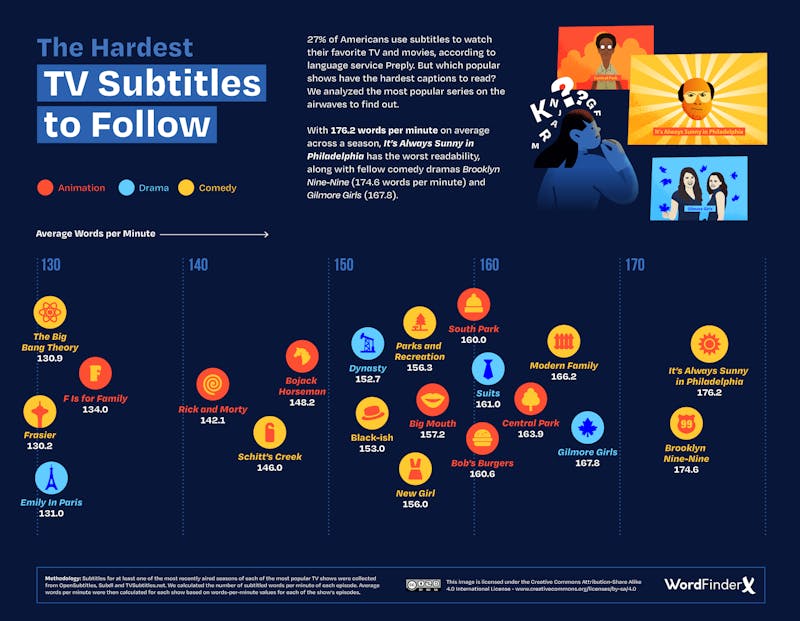
Comedies account for nine of the top 20 wordiest popular TV shows, while no sci-fi, fantasy or superhero shows make it at all. The comedy-drama Gilmore Girls sneaks into the top three behind Always Sunny and Brooklyn Nine-Nine. At the same time,musical sitcom Central Park leads a verbose roster of seven animations among the most difficult shows to word unscramble in any genre.
Central Park, the “save the park” comedy musical from the creators of Bob’s Burgers, is so stuffed with storylines, relationships and surplus characters, that the wpm needs dialing up just to get through an episode. Josh Gad’s busker character, Birdie, “serves as the show’s narrator, a role that is so unnecessary that half of the songs and dialogue featuring him are dedicated to clarifying that his character definitely serves a purpose,” according to one reviewer. Compared to Rick and Morty (142.1 wpm), which defines and redefines multiple universes multiple times per episode and still makes room for anatomy jokes and an unnatural level of “yeahs” and “uhs,” it does seem that Central Park (163.9 wpm) could prune a lyric or two.
At an average 133.6 wpm across the top 15, comedy’s the wordiest genre. Sitcoms have a dual purpose in hitting you with rapid-fire dialogue. Firstly, they go deep rather than broad, burrowing into layers of the characters’ personal neuroses while playing a confined narrative and visual field. And secondly, they keep up the comedic momentum — go too long without a chuckle, and you might start to wonder why you’re watching “a show about nothing.” Even though sitcoms aren’t classically about the smartest of characters, they can be complex to follow because comedy cuts to the heart of the human condition; that’s why Always Sunny gets away with being 33% wordier than Frasier.
The fast-talking in Gilmore Girls achieves three things. Firstly, it brings the actual meat of the show — which revolves around the characters’ responding to and analyzing their lives, rather than relying on headline moments. Second, it creates that sizzling screwball effect that gives the show its charm. And thirdly, on a related note, it creates the impression that the show that “needs to talk, talk, talk” may be wittier than it actually is… according to the parody Gabmore Girls, anyway.
At an average of just 70.2 wpm across the genre’s 15 wordiest shows, sci-fi and fantasy is the least wordy category in our study — with nearly half the dialogue of the average comedy. It’s true that sci-fi has a more expansive visual world to explore, plus a limitless supply of visual metaphors to convey its story. Still, it is also likely that these shows slow down the dialogue just because there is so much more narrative and worldbuilding to parse in each episode. Notably, Andor — “a Disney+ show for adults” — has the highest word rate of the recent Star Wars shows, although whether this indicates faith in the grown-up audience or the more easily understood Earth-like lives and dialogue of its characters is up for debate.
Superheroes are supposed to talk with their actions, and the genre has the second lowest word count (88.7 wpm) after sci-fi/fantasy. However, with its poignant monologues and ever-revolving door of characters to introduce, DC's Legends Of Tomorrow hits a chatty 115.0 wpm. She-Hulk comes a close second at 111.4 wpm (well, she’s an attorney as well as a Hulk). Still,fans have questioned some of the more didactic dialogue in the show, with one writer asking, “is there a name for this type of tv dialogue that's meant to be a viral screenshot on twitter?”
Wetly Squelching Tentacles
Curious how these shows measure up against each other? Get your wetly squelching tentacles over the full data displayed in the interactive table below, for a less wordy sense of just how much wordier some of these shows are than others.
Subtitles writers have their work cut out to accurately convey what today’s fast-talking characters are saying without producing subtitles that are too wordy to follow. But with captions becoming the regular way that people watch shows, the culture is shifting to match. The meme-ready dialogue of She-Hulk — written clause by clause in easily digestible, consequent chunks — could be the start of how subtitles change our whole way of writing for TV.
METHODOLOGY & SOURCES
Subtitles for at least one most recently aired season of each of the most popular TV shows were collected from OpenSubtitles, Subdl and TVSubtitles.net. Subtitles were then parsed using the 'srt' package in R to calculate the number of subtitled words per minute of the episode of each TV show. Average words per minute were then calculated for each show based on words-per-minute values for each of the show's episodes.
The data was gathered in November 2022.
